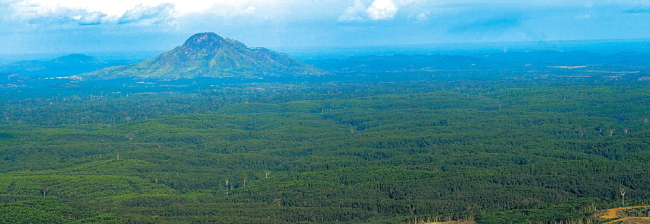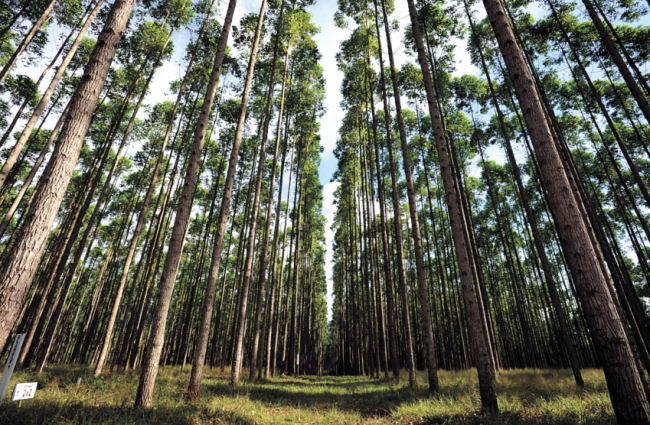Companies turn eyes to overseas plantations
Korea Forest Service offers various incentives to spur investments
By Korea HeraldPublished : July 9, 2013 - 20:07

More and more Korean companies are turning their eyes to overseas plantations as part of their investments.
Unlike other industries suffering from the global protracted economic slump, companies’ investments in overseas plantations have dramatically increased, according to the Korea Forest Service.
In a report released by the KFS last month, Korean companies established forest plantations of about 26,000 hectares ― 90 times the size of Yeouido ― in six countries. They included Indonesia, Cambodia, the Solomon Islands and Uruguay. This is a 25 percent increase from about 20,000 hectares in 2010.

To secure a long-term timber supply, the KFS initiated overseas plantations in 1993, and by 2012 Korean companies had managed to plant over 280,000 hectares in total ― an area five times the size of Seoul ― in Southeast Asian, South American and Oceanic countries.
In 2007, the KFS mastered a plan for overseas forest resources development, which aims to develop another 250,000 hectares of plantation land between 2008 and 2017. As of now, the area of overseas plantations added in 2008, 2009 and 2010 was 38,000 hectares, 28,000 hectares and 21,000 hectares, respectively.
The KFS wishes to continue its efforts by expanding its overseas plantations to 1 million hectares by 2050 in order to meet the domestic demand for timber. Overseas plantation projects are centered on the following activities: 11 industrial plantations for timber; 21 plantations for carbon credits and 31 bioenergy plantations for securing biodiesel and other bioenergy sources.
By size, industrial plantations account for 201,123 hectares (72 percent), bioenergy plantations 73,068 hectares (26 percent) and plantations for carbon credits 5,187 hectares (2 percent).
Unlike other industries suffering from the global protracted economic slump, companies’ investments in overseas plantations have dramatically increased, according to the Korea Forest Service.
In a report released by the KFS last month, Korean companies established forest plantations of about 26,000 hectares ― 90 times the size of Yeouido ― in six countries. They included Indonesia, Cambodia, the Solomon Islands and Uruguay. This is a 25 percent increase from about 20,000 hectares in 2010.

To secure a long-term timber supply, the KFS initiated overseas plantations in 1993, and by 2012 Korean companies had managed to plant over 280,000 hectares in total ― an area five times the size of Seoul ― in Southeast Asian, South American and Oceanic countries.
In 2007, the KFS mastered a plan for overseas forest resources development, which aims to develop another 250,000 hectares of plantation land between 2008 and 2017. As of now, the area of overseas plantations added in 2008, 2009 and 2010 was 38,000 hectares, 28,000 hectares and 21,000 hectares, respectively.
The KFS wishes to continue its efforts by expanding its overseas plantations to 1 million hectares by 2050 in order to meet the domestic demand for timber. Overseas plantation projects are centered on the following activities: 11 industrial plantations for timber; 21 plantations for carbon credits and 31 bioenergy plantations for securing biodiesel and other bioenergy sources.
By size, industrial plantations account for 201,123 hectares (72 percent), bioenergy plantations 73,068 hectares (26 percent) and plantations for carbon credits 5,187 hectares (2 percent).

In the past, investment has been made mainly for industrial plantations. But since 2008, investments in palm oil tree plantations or wood pellets to get bioenergies have sharply increased, KFS officials said.
The increase means that the importance of forestry in global efforts to reduce greenhouse gas and to cope with climate change is mounting, the officials added.
In this sense, the KFS, which is in charge of government policies on forestry, is promoting various supportive measures to boost overseas plantations by domestic companies.
First, the KFS plans to support soft loans to companies seeking to make overseas investment in plantations, silviculture and reprocessing businesses. For this, the agency expanded its budget for that purpose to 23 billion won.
In addition, the government is providing up to 70 percent of the cost for companies’ on-site feasibility studies for overseas plantations, according to the officials. Expenses for research to sound out investments in timber reprocessing will be supported by the government as well.
Other measures to reactivate investment in overseas plantations by private companies include an increase in policy funds, support of providing young interns to investors and strengthening resources diplomacy toward Latin American countries.
Ryu Kwang-su, director general of the international affairs bureau at the KFS, said, “We plan to strengthen our support for private companies in order to expand overseas plantations.
“We will seek to achieve the target of 1 million hectares of overseas plantations by 2050 without fail.”
In a separate move, the KFS is making continued efforts to promote forest cooperation with foreign countries.
These agreements will help ensure investment safety and promote overseas forest resources development, according to industry observers.
They are also expected to eventually contribute to stabilizing the domestic timber supply, improving the capability of addressing climate change and enhancing national competitiveness through overseas forest resources development as a new leader toward green growth, the observers added.
The KFS has been maintaining a close relationship with many countries. Based on these established relationships, the agency is seeking to secure available sites for overseas plantations and also helps Korean forest investors solve their obstacles.
Since the Korea-Indonesia forestry cooperation was initiated in 1987, the KFS has signed bilateral agreements on forestry cooperation with many countries including New Zealand, Australia, China, Mongolia, Vietnam, Myanmar, Russia, Cambodia, Uruguay, Paraguay, Tunisia and Chile.
By Lee Kwon-hyung (kwonhl@heraldcorp.com)
-
Articles by Korea Herald











![[Hello India] Hyundai Motor vows to boost 'clean mobility' in India](http://res.heraldm.com/phpwas/restmb_idxmake.php?idx=644&simg=/content/image/2024/04/25/20240425050672_0.jpg&u=)








